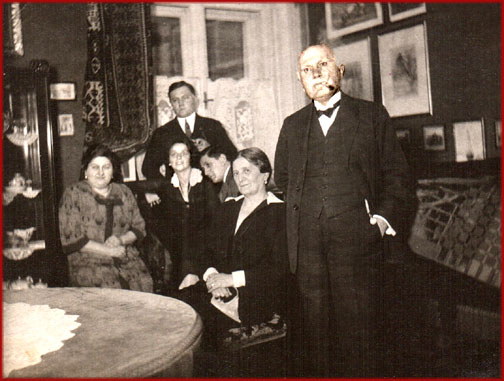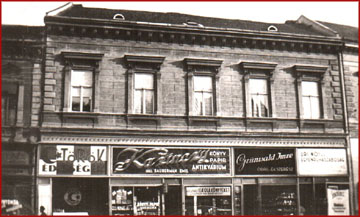




Right to left: Gyula Sugar, his wife Ilona Falvai, their son Imre Sugar,
Imre’s wife Julia Breuer, family friends Janos Sarga and Gizella.
The photo is believed to have been taken in the 1920s or 1930s.

Gyula Sugar
Miskolc researcher Andras Hirschler knows that his great-great-great-grandfather Samuel Sugar “was not Jewish ethnically. He was a Szekely Sabbatist.” The Szekely were a sizeable minority in Transylvania, who are believed to have been descended from ethnic Hungarian troops that were sent to defend the Hungarian border against the invading Turks. An article in the Encyclopaedia Britannica on the Szekely people says that “according to their own tradition, repeated in Procopius’ De bello Gothico, they were descended from Attila’s Huns. It is, however, now generally accepted that they are true Hungarians or Magyars (or at least the descendants of a Magyarized Turki people) transplanted there to guard the frontier, their name meaning simply ‘frontier guards.'”[1]
As the Reformation spread, many Szekely became Unitarians who rejected Christian belief in the Trinity. By the end of the sixteenth century, some had split from the Unitarians to become Sabbatists. In their view, the biblical Sabbath never should have been abrogated. Like the Jews, they believed that the Sabbath properly was to be observed on Saturday rather than on Sunday. That is why the Szekely Sabbatists were known as somrei sabat –- transliterated Hungarian of the Hebrew phrase shomrei shabbat or “guardians of the Sabbath,” meaning that they were Sabbath observers.
Notable numbers of Szekely Sabbatists intermarried with Hungarian Jews and eventually were absorbed into the Jewish community. See, for example, the memoir of Marianne Bach Vaney (born in Debrecen, Hungary), whose mother was from Transylvania: “According to the family chronicles her mother [i.e. Vaney’s grandmother] came from a Protestant sect, the Sabbatists, and she was converted to the Jewish faith when she married my grandfather. However, she became a very religious woman. She taught me the only [Jewish] prayer I still know by heart, the Schema Yisroel.” [2]
Andras Hirschler’s great-great-great-grandfather Samuel Sugar was one of the somrei sabat Szekely who married into a Jewish family. Samuel’s grandson Gyula Sugar was born in Miskolc in 1870. Andras noted that his great-grandfather Gyula was “a well-known and popular lawyer in Miskolc [who]... wrote several entertaining books about Miskolc and [its] surroundings.” Gyula’s wife Ilona Falvai was born in Hodmezovasarhely in 1869 and was the daughter of Mizzi Klein and Bernat Falvai. Gyula and Ilona were living at Szechenyi utca 80 in Miskolc when they were deported to Auschwitz, where they were murdered in June, 1944. Their son Imre Sugar was married to Julia Breuer. Imre and Julia had a daughter, who is the mother of Andras Hirschler.

Site of the Sugar residence at Szechenyi utca 80 in Miskolc
ENDNOTES
1- http://www.britannica.com/EBchecked/topic/579333/Szekler
2- http://www.raoul-wallenberg.asso.fr/wallenberg_arch/wallenberg_test/mvaney.html
Credits: Text and page design copyrighted © 2009 by Helene Kenvin. Photographs copyrighted © 2009 by Andras Hirschler. Page created by Helene Kenvin. All rights reserved.